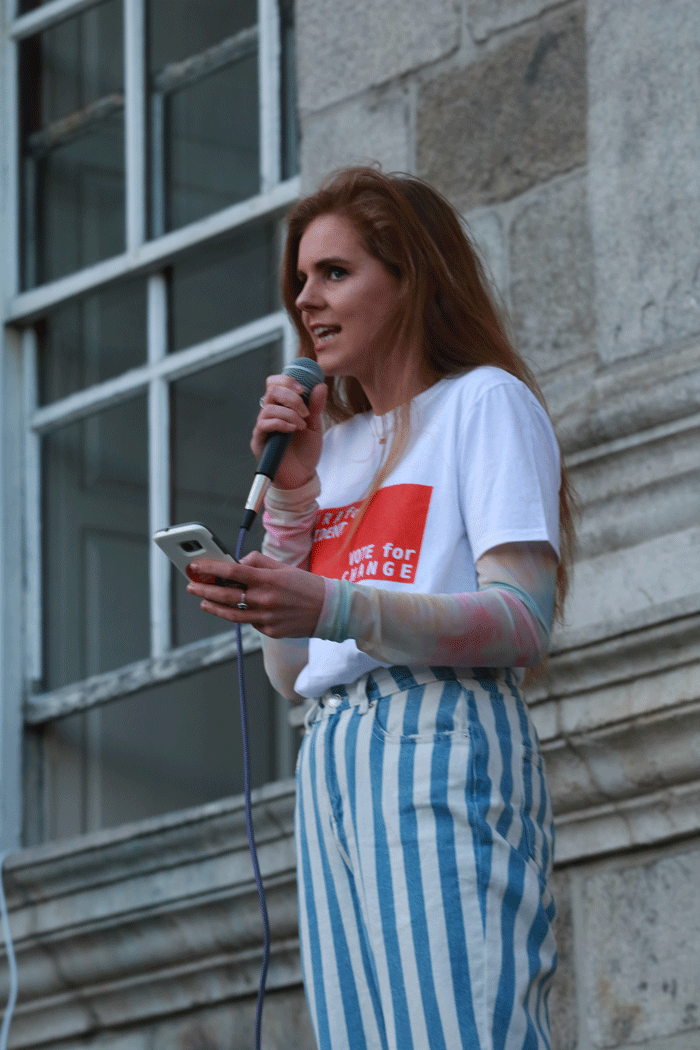Laura Beston has been elected Trinity College Dublin Students’ Union President on the first count with 55 per cent of the vote.
Beston’s sole opponent, Daire Hennessy, received 36 per cent of the vote. On Tuesday, a poll of over 1,000 students conducted by The University Times predicted a comfortable victory for Beston, with 53.2 per cent of the vote compared to Hennessy’s 40.8 per cent.
Boston received 1,844 votes from a total valid poll of 3,355 votes. Hennessy received 1,357 votes.
Beston has served as TCDSU’s Officer for Students with Disabilities for two years, and was a leading figure in last year’s Take Back Trinity campaign.
As the first female presidential candidate since Lynn Ruane’s successful campaign in 2015, Beston cemented herself as the favourite from the outset with strong performances in each of the four hustings events, in a race characterised by its focus on ideology rather than policy.
After last year’s hotly contested four-person presidential race, the lesser number of candidates in this year’s elections gave both contenders an opportunity to develop their approaches at their ease, with subtle differences emerging between Beston and Hennessy over the campaign period.
With a manifesto emphasising the themes of “empowerment” and “inclusion”, and with emphasis on her extensive experience with the union and activism more broadly, Beston shared the sentiment of her more stringently anti-establishment opponent’s campaign – but struck a more disciplined balance between her own frustration with the union and her vision for its reform.
Promising to focus on both national and local issues – a dividing issue among presidential candidates in recent years – Beston used the campaign period to establish a link between large scale student politics and campus-focused issues. “My campaign seems so nationally focused, but it’s not”, she told those assembled at Council and Equality Hustings last Tuesday. “It’s about students.”
This focus on students and empowerment allowed an introspective approach from Beston, in what was overall a personal campaign, with references to her own initial disillusionment with union politics common throughout.
“I know when I sat in those seats as one of you that the SU hadn’t done much for me”, Beston confessed at halls Hustings on Monday. “I want to be able to come here next year watching the next batch of candidates knowing that every single student sitting in that crowd has felt listened to and supported by their SU.”
Beston recalled similar tensions from her experience with Take Back Trinity at last Thursday’s media hustings, expressing frustration at being “policed” by those within the union over the course of the movement’s campaign.
These references to Take Back Trinity forced her, at several points throughout the campaign, to deny that she was too radical to represent all students. Tonight’s result signifies that she was successful in marrying her background in grassroots activism with her extensive union experience.
While she has tonight received the backing of Trinity students, Beston’s presidency will not be without its challenges. First of all, there is the matter of TEP. Beston is keen to create feedback mechanisms wherein constant communication with students caucus groups will pave the way to overcome the obstacles posed by Trinity’s new semesterisation and assessment methods. And then there is the critical issue of student engagement – while Beston fronts a strong pitch to rekindle interest in the union, one wonders how logistically she plans to achieve what so many before her have tried and failed to do. Equally pressing is the the delicate task of surmounting the €40,000 deficit facing the union.
Beston proved herself to be a highly capable candidate throughout a testing election campaign. Time will tell if TCDSU’s president-elect will succeed in overcoming the significant challenges before her and her sabbatical team.
Correction: March 1st, 2019
An earlier version of this article incorrectly stated that Laura Beston received 49 per cent of the vote. In fact, she received 55 per cent.
An earlier version of this article said that Lynn Ruane ran for president in 2014. In fact, she ran in 2015.







